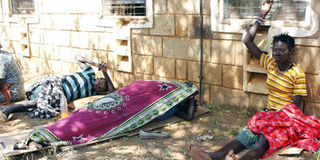Health care: Let’s put our money where our mouth is!

Patients attended to at Mukutani Dispensary in Baringo south on February 29, 2016 after eating meat of a cow which died from a mysterious disease. PHOTO | CHEBOITE KIGEN | NATION MEDIA GROUP
What you need to know:
President Uhuru Kenyatta has pledged to do everything in his power to ensure that “affordable healthcare for all” is achieved in this term.
Healthcare professionals have been singing about the need to desegregate healthcare services for a long time, and they now have something to hold the government accountable for.
It has been said a society is judged by the manner in which it handles its most vulnerable persons.
We also know ill-health that incapacitates an otherwise well-functioning individual creates a level of helplessness and vulnerability that can make one question their very reason for being.
For a long time, access to healthcare of acceptable quality has been a factor of socio-economic status. Poorer countries have accepted third-rate health systems, subjecting their populations to increased morbidity and mortality as well as a poorer quality of life because of their poverty.
Even within countries, wealthier individuals and families have been able to access the best healthcare in the world, wherever it is to be found, while poorer people have had to make do with what is essentially voodoo in the name of public health systems. The new Director-General of the World Health Organisation (WHO), Dr Tedros Adhanom Ghebreyesus, came into office with the promise of making universal health coverage (UHC) a top priority across the world. He has continued to push an aggressive campaign to get countries to sign on and help make it a reality.
AFFORDABLE
In the past few weeks, President Uhuru Kenyatta has been setting out the priorities for his government over the coming five years, and it is gratifying to note that for the first time in our history health is ranking as one of the four priorities his government has decided on.
He has pledged to do everything in his power to ensure that “affordable healthcare for all” is achieved in this term. What we expect as a result is that we will begin to make huge dents in the system of healthcare apartheid in this country that condemns poor people to receive sub-standard care (often in the name of “local solutions” and “respecting cultural practices”) while rich people from the same ethnocultural backgrounds benefit from cutting edge health care within this country and abroad.
Healthcare professionals have been singing about the need to desegregate healthcare services for a long time, and they now have something to hold the government accountable for.
From where we sit, we expect a number of ground-breaking policy and legal interventions that will make this pledge a success.
We do not expect much opposition to these initiatives for two reasons. Firstly, the President enjoys full control of both houses of Parliament as currently constituted, and secondly, one doubts that opposition legislators would gang up to try and block such a beneficial intervention.
BARRIER
We know the biggest barrier to UHC is financing. We, therefore, expect creative measures to increase health funding, such as a special protected health fund to guarantee coverage for the commonest causes of illness and death in this country.
One can imagine multiple sources of money for such a fund, but the primary one would be a health tax which would be restricted only to funding healthcare access.
Other sources would include taxes and fines on commodities and activities that increase illness and death in this country, such as cigarettes, alcohol, violation of traffic rules, risky activities, and even environmental pollutants like fossil fuels, among others.
The health fund would then be run in a transparent manner to ensure that health facilities are well equipped and provisioned, and that adequate human resources are deployed within an acceptable radius of any homestead across the republic.
TOP KILLERS
In the beginning, the fund might want to determine the top killers and causes of illness in the country, and to guarantee care for these for all Kenyans.
Prioritisation of human resources, equipment and commodities to tackle these ailments would result in a gradual change in the complexion of health and illness in this country.
Obviously this will also affect our health research and specialised human resource needs, and these would need to be reviewed periodically as the disease landscape changes in response to these initiatives.
In my view, therefore, we must put our money where our mouth is if we are to achieve universal health coverage in this generation.
Atwoli is Associate Professor and Dean, Moi University School of Medicine [email protected]





